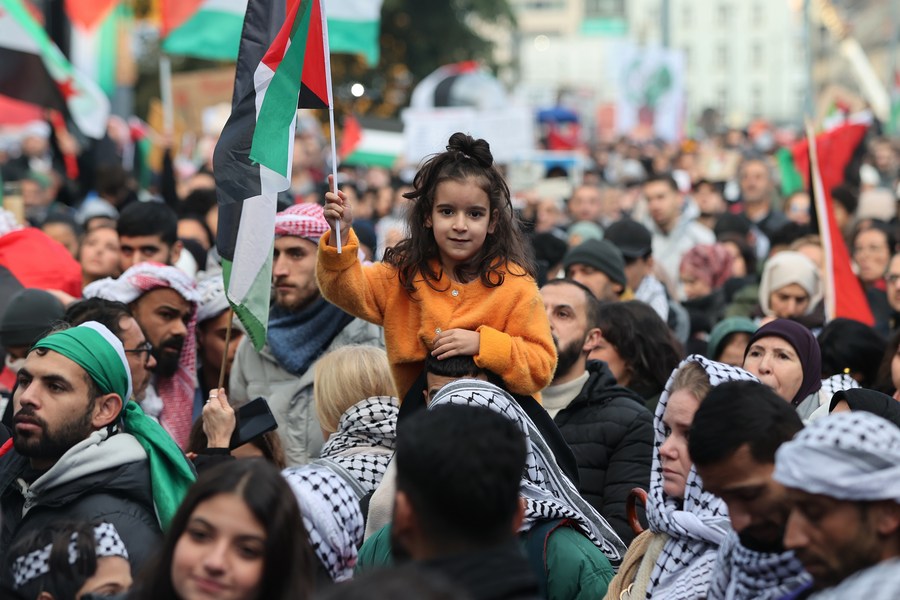Europe’s response to the Israel-Hamas conflict has been chaotic and rifts have been evident within the EU…reports Asian Lite News
More than two months into the Israel-Hamas conflict, violence in the Middle East has no end in sight and Europe as a neighbor is still struggling to unify around a call for ceasefire in Gaza.
The European Union (EU) summit ended on Friday without a much-expected tougher stance on the conflict or a call for immediate ceasefire, though 17 out of all its 27 members had voted for a resolution calling for a ceasefire at the United Nations (UN) on Tuesday. In October, only eight members voted for a UN resolution advocating for a truce.
Despite Europe’s strong will to intercede, the conflict has torn apart the bloc itself, revealing some of its profound political, social and economic divides and triggering grave concerns among the public.
Europe’s response to the Israel-Hamas conflict has been chaotic and rifts have been evident within the EU. European Commission President Ursula von der Leyen’s statement of unconditional support for Israel and her initial reactions after the Oct. 7 attack contrasted sharply with the approach of other EU leaders, including foreign policy chief Josep Borrell, and angered many both in Brussels and in the member states’ capitals.
Nearly three weeks after the outbreak of the conflict, last-minute talks at an EU summit centered on whether to call for “a pause” or “pauses.” The bloc, struggling to agree on a united stance, has largely limited itself to supporting Israel’s right to defend itself within international law and called for “pauses.”
Individual member countries, such as Germany, Austria, the Czech Republic and Hungary, have voiced strong support for Israel, while others, including Ireland, Belgium and Spain, have criticized Israel’s military action.
The cacophony of European messages showed “not only a deplorable failure of coordination among EU officials,” Stefan Lehne, a senior fellow at Carnegie Europe, said in an article published on the international affairs think tank’s website. “It also brought to the surface the long-standing divisions between the member states that support Israel unconditionally and others that feel equal sympathy for the suffering of the Palestinians.”
From London to Paris and Berlin, Europe feels the ripples from the crisis in the Middle East as it struggles to balance fears of rising anti-Semitism and the rights of protesters, who have marched for weeks in the streets of big cities.
Rifts within the EU challenge the bloc’s cohesion as members, such as Italy, re-imposed border controls, leading to “an erosion of the Schengen border-free area,” Luigi Scazzieri, senior research fellow at the Center for European Reform think tank, commented.
Growing nativist anti-immigration sentiment and Islamophobia may reshape the political landscapes in many countries and boost the popularity of radical right parties, such as Germany’s Alternative fur Deutschland or France’s Rassemblement National, he said.
“These same political forces would be strengthened if the fighting sparked an influx of refugees from Gaza or from other countries in the region,” Scazzieri said.
As far-right parties are garnering growing public support in countries such as Italy, Spain, Germany and the Netherlands, Europe’s shift to the right is expected to continue during the European Parliament elections next year.
While authorities across Europe have been grappling with divisions, disaccord and frailty, the people — many of them still traumatized by nightmarish memories from last century’s wars — are anxious to see an end to the atrocity.
Aghast at the bloodshed, many Europeans are angered by the soft stance and passive reactions from the EU and the governments of its member states.
A neighbor of the Middle East and home to huge Jewish and Muslim populations, the EU has a major stake in the crisis, and the ripple effects of the conflict in Europe are feared to fuel both anti-Semitism and Islamophobia.
Eighty-two percent of the French people think the conflict will have repercussions on the terrorist risk in France, according to the Harris Interactive barometer for the French news channel LCI, published towards the end of October.
Europe now faces a “huge risk of terrorist attacks” over the Christmas holiday period, EU Home Affairs Commissioner Ylva Johansson warned in early December.
The conflict also imperils Europe’s fragile economy which is still battling recession amid inflation concerns and the aftermath of last year’s energy crisis.
Goldman Sachs said in November that the most important and potentially impactful way in which tensions could spill over into the European economy is through the oil and gas markets. Unless the energy price pressures remain contained, the Israel-Hamas conflict could have a significant impact on economic growth and inflation in the eurozone, it warned.
Following the EU summit on Friday, European Council President Charles Michel said that leaders had solidified their common position and discussed the bloc’s vision for a long-term peaceful solution to the conflict based on the two-state solution.
ALSO READ-Migration Threatens to Overwhelm Europe, Warns UK PM

Leave a Reply